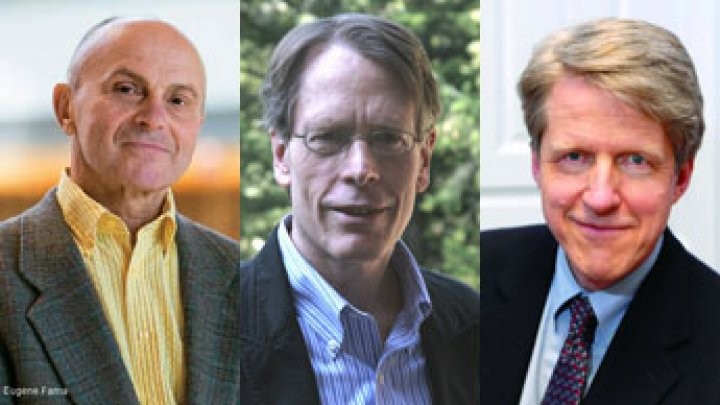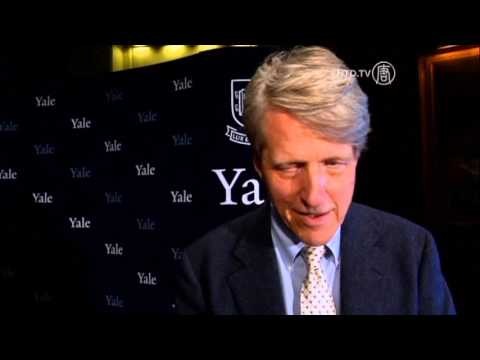American trio share Nobel economics prize for work on asset prices
Post on: 16 Март, 2015 No Comment

The widespread criticism of economists’ failure to predict the banking crash was addressed on Monday by the Nobel committee when it awarded the much coveted prize for economics to three academics who try to show how financial markets work.
The Royal Swedish Academy of Sciences awarded the prize to Eugene Fama and Lars Peter Hansen of the ultra-conservative Chicago school alongside Robert Shiller. the liberal Yale economist famous for warning of the US sub-prime housing bubble in 2005.
The academy said it was honouring the three prizewinners for their work examining the way markets work. They will share the prize of Skr8m (781,782) equally.
The academy said the three economists were at the top of their field for their empirical analysis of asset prices that greatly improved our understanding of how financial markets work, when they seem to work well and when they seem to work otherwise.
Fama, 74, is notorious in leftwing circles for denying financial bubbles exist and asserting recessions are a largely unexplainable fixture of capitalism that should be allowed to take their course. His research has examined how external factors such as insider trading and government regulation can distort the workings of financial markets.
In the years before the crash he joined other disciples of Friedman, including former Federal Reserve boss Alan Greenspan, in defending the efficient-markets hypothesis that underpinned the deregulation of the banking system.
In the aftermath of the banking crash, Fama blamed the US government, arguing its policy of loosening laws restricting access to credit was at the heart of the crisis. He said the banking industry acted rationally in response to distorting incentives put in place by an interfering government. The American mortgage giants, Fannie Mae and Freddie Mac, were encouraged to lower the bar to lending, fuelling the sub-prime boom.
The financial markets were a casualty of the recession, not a cause of it, he told the New Yorker in 2010.
Fama has recently specialised in producing models that show the way stock markets and other asset markets work.
Hansen, 60, is best known for his work modelling how economic actors cope with risk and changing environments.
Fama and Hansen join 87 other Nobel Prize winners affiliated with Chicago University. Their success means eight Nobel winners will be working at the faculty, including six in economics.
Shiller, 67, has risen to prominence following a career that has seen him adapt free-market theories to take on board concepts of exuberance and irrationality. Unlike Fama, who denies it is possible to measure whether assets are overpriced, Shiller has documented how markets can fall victim to bubbles that become unsustainable.
In a video interview with the Guardian last year he said finance was not about making money but making money work for the good of communities. His book Irrational Exuberance, published in 2000, debunked the idea that markets always price assets efficiently, without triggering bubbles.
David Blanchflower, an economics professor at the Ivy League university Dartmouth College and a former member of the Bank of England’s interest rate setting committee, said Fama’s research was a flawed attempt to show that unencumbered markets worked efficiently.
At some point the Nobel prize economics committee will start to award economics prizes to people who have actually discovered stuff about the real world rather than a made-up dream world, he said.
A good test in medicine is whether the recipient’s research has saved a million lives. In economics it’s about writing down clever squiggles on diddles that mostly gets rewarded. Shiller is one of a few exceptions.
Ray Barrell, an economics professor at Brunel university and a former director at the National Institute of Economic & Social Research, said Fama’s research has helped us understand financial markets and he was less dogmatic in support of free-market theories than many other Chicago University academics.
The academy said: While it is hard to predict whether stock or bond prices will go up or down in the short term, it is possible to foresee movements over periods of three years or longer. These findings, which might seem surprising and contradictory, were made and analysed by this year’s laureates.
Americans have dominated the economics awards in recent years; the last time there were no US economists among the winners was in 1999.
The Nobel committees have now announced all six of the annual awards for 2013.
The economics award is not a Nobel prize in the same sense as the medicine, chemistry, physics, literature and peace prizes, which were created by Swedish industrialist Alfred Nobel in 1895. Sweden’s central bank added the economics prize in 1968 as a memorial to Nobel.
Lars Peter Hansen

In another triumph for Chicago University, Hansen, 60, has been rewarded for his work developing a statistical method to test theories of asset pricing.
In 1982 Hansen presented a statistical theory – called the Generalized Method of Moments – then used it to test whether historical share prices were consistent with the best known asset-pricing model at the time. He found the methods being used must be rejected because they failed to explain share movements. As a result, Hansen’s work helped confirm Shiller’s preliminary findings on bubbles and inspired new research.
It was described as the perfect balance between Shiller’s inefficient market theory on one side, and Fama’s espousal of efficient markets on the other.
Eugene Fama
Chicago University states that Fama, 74, is widely recognized as the father of modern finance, although that boast is clearly double-edged given the markets’ recent performance.
His views are considered to be the direct opposite of Shiller’s, as they are based on the efficient markets hypothesis. This is the idea that markets incorporate all known information about an asset’s value, making it pointless trying to predict which way they will move.
On Monday, Fama was preparing to teach his first class as a Nobel laureate. Asked if his students would receive special treatment, he told the Associated Press: We’ll see, but they’re going to get an exam tomorrow anyway. They paid their money; they’re going to get the full pill.
Robert Shiller
Shiller, 67, is one of the few economists who can claim to have foreseen both the bursting of the dotcom bubble and the US housing crash.
His prescient book Irrational Exuberance was first published in 2000, and he followed it up with a second edition in 2005, which took the then unfashionable view that US housing looked dangerously overvalued.
A professor of economics at Yale University, Shiller received his first degree from the Michigan University and his economics PhD from the Massachusetts Institute of Technology.
He has given his name – along with colleague Karl Case – to the most closely watched housing market indicator in the US, the S&P/Case-Shiller Home Price Index. His most recent book, Finance and the Good Society, is about the benefits of financial innovation.














